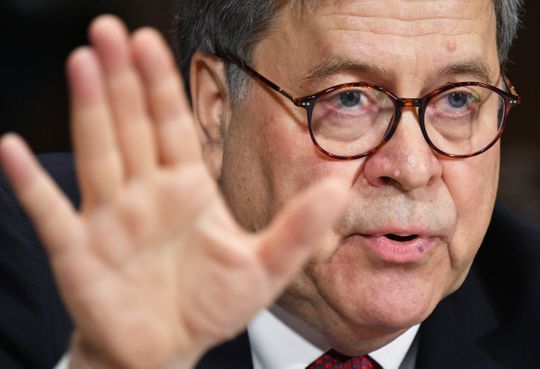The attorney general of the United States misled the country about an investigation implicating the president. Then he lied to Congress. Then he did something worse: He effectively said that the president of the United States is above the law.
William Barr should resign.
My first experience in public service was as an assistant U.S. attorney in Los Angeles. That office within the Department of Justice was populated then, and is now, with men and women of extraordinary talent, love of country and dedication to the impartial enforcement of the law.
The public servants there and in similar offices around the country deserve an attorney general who shares their abiding commitment to the rule of law, demonstrates strength and independence, speaks truth to power and represents no one person, but all Americans.
After the events of this past month, it is clear that Barr is not that leader. And more than that, he is dangerous.
When Barr was first nominated as attorney general, I said he should not be confirmed absent a firm recusal from special counsel Robert Mueller’s investigation and those cases stemming from it because he had such a clear bias. Barr had essentially applied for the job through a 19-page unsolicited memo that he sent to the department and shared with President Donald Trump’s lawyers. In it he defended the president’s actionsin office and articulating a discredited legal theory about why the president’s actions could not amount to obstruction of justice.
Barr helped Trump mislead the country
Notwithstanding my opposition to his confirmation, I hoped that Barr would surprise the country and demonstrate independence and integrity as he took the reins of the Department of Justice at this important moment in our nation’s history. But any hope was misplaced, and any fear more than justified: his actions have compromised public confidence in the investigation, the DOJ and the rule of law.
When Mueller finished his nearly two-year investigation, Barr could have released Mueller’s own summaries. He instead chose to write his own summary, and one that mischaracterized Mueller’s findings and conclusions. He could have sought court permission to release the grand jury material it included. He refused.
He decided to amplify Trump’s false talking points about “collusion,” knowing that Mueller made no finding about a term that includes both criminal and noncriminal conduct. Even though Mueller deliberately chose not make a charging decision about obstruction of justice because of the restrictions of DOJ policy, Barr instead made such a decision in two days. The attorney general made the calculated decision to disregard the concerns of the special counsel and help the president mislead the country in advance of the release of a report damning to the president on almost every page.
And then Barr lied about it.
AG has undermined public confidence
In testimony to the House Appropriations Committee on April 9, Rep. Charlie Crist, D-Fla., asked Barr if he knew the basis of reports that members of the special counsel’s team were “frustrated” by his decision to release a four-page summary of the Mueller report, rather than the summaries the special counsel had prepared for that purpose. Barr responded, “No, I don’t.”
That was false. In a letter that became public only this week, we now know that Mueller wrote the attorney general on March 27, two days after Barr’s four-page summary, to ask that he release the executive summaries that Mueller’s team had already prepared for the public, and to complain that the letter from Barr failed to capture the “context, nature, and substance” of his work and conclusions and had caused “public confusion about critical aspects” of the investigation. And yet Barr’s answer to a simple question from a member of Congress was to act as if Mueller had never communicated these serious objections.
In his March 27 letter, Mueller stated that Barr’s actions had undermined a central purpose of the special counsel regulations, to “assure full public confidence in the outcome” of the investigation. Mueller was right, but Barr’s actions and statements have done far worse than that. They have undermined public confidence in the independence of the DOJ and the fair administration of justice.
Barr logic means Trump could end all probes
In testimony to the Senate Judiciary Committee on May 1, Barr gave no convincing defense of his actions, nor his false statements to Congress, nor why the obstruction of justice laws do not apply to a president who instructs those around him to lie in an effort to conceal his actions.
Instead, he said the president can end a criminal investigation simply because he thinks it’s “unfair” or unwarranted: “I think the department’s position would be that the president can direct the termination or the replacement of a special counsel.”
If you take the view that the president could not only act with impunity to end the Mueller probe, then you must believe Richard Nixon had every right to fire those investigating him during Watergate, and the Saturday Night Massacre was the mere exercise of executive authority. More ominously, if Trump is within his right to fire a special counsel, he can now act to end the 14 investigations that Mueller referred to other prosecutors, as well as the campaign finance fraud investigation in the Southern District of New York in which the president has been effectively identified as an unindicted co-conspirator.
When a president can end an investigation in which he is implicated simply because he thinks it unfair, it stands to reason he can end others on the same pretext. There is no limiting principle to this lawless idea.
That makes Bill Barr the second most dangerous man in the country. It also renders him grossly unfit for office.








































admin in: How the Muslim Brotherhood betrayed Saudi Arabia?
Great article with insight ...
https://www.viagrapascherfr.com/achat-sildenafil-pfizer-tarif/ in: Cross-region cooperation between anti-terrorism agencies needed
Hello there, just became aware of your blog through Google, and found ...